Iran, Venezuela, and the Face of Resistance

Amidst the chess-like geopolitical deliberations surrounding the maunfactured showdown over Iran's nuclear energy capacity, a much more intriguing set of strategic military, political, and economic developments has begun to unfold among governments taking a more overt position against the geostrategic machinations of Uncle Sam and its vassal states.
Two recent polls - one commissioned by Pew Research Centre and the other by Harris - paint of picture of a world angry at Uncle Sam's behavior and untrusting of its ambitions. The Harris Poll confined itself to opinion about Uncle Sam in Europe, finding: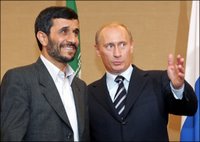 This climate of distrust provided the backdrop for last week's Shanghai Cooperation Organisation negotiations in China, which brought together the leaders of 10 nations in and around central Asia. In the Guardian, Jonathan Watts highlights the myriad ways in which the meeting infringed on Uncle Sam's strategic interests:
This climate of distrust provided the backdrop for last week's Shanghai Cooperation Organisation negotiations in China, which brought together the leaders of 10 nations in and around central Asia. In the Guardian, Jonathan Watts highlights the myriad ways in which the meeting infringed on Uncle Sam's strategic interests:
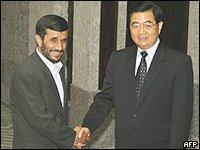 Such a developing alliance unified around resisting Uncle Sam's imperial grand strategy has many different components. Economically, China has begun to deepen its relationship with Iran while reaching out to African nations, including one of Uncle Sam's most obedient vassal states: Egypt. And, in a move that binds together Venezuela with Uncle Sam's chief nemesis in each hemisphere, Michael Fox reported in Venezuela Analysis that:
Such a developing alliance unified around resisting Uncle Sam's imperial grand strategy has many different components. Economically, China has begun to deepen its relationship with Iran while reaching out to African nations, including one of Uncle Sam's most obedient vassal states: Egypt. And, in a move that binds together Venezuela with Uncle Sam's chief nemesis in each hemisphere, Michael Fox reported in Venezuela Analysis that:
These moves - which aim to build a strong, unified, global economic foundation - represent an important element in the anti-imperialist struggle against Uncle Sam's oppressive neoliberal brand of economic suffocation. Moves away from the Greenback, which we've documented extensively here at Savage Justice help to build this foundation, too.
And while it is essential to create an economic infrastructre capable of operating outside Uncle Sam's hegemonic domination, it is naive to think of creating such an infrastructure without simultaneously making preparations to defend it - by force, if necessary.
To that end, the same countries resisting Uncle Sam's 'Debt Leverage Imperialism' economic model have, to Sam's chagrin, also begun to deepen their military ties. Registering its hostility to this development, the AP reported that Uncle Sam sanctioned four Chinese companies on fake pretexts, accusing it of helping Iran acquire weapons of mass destruction.
Syria and Iran just announced a series of new cooperation agreements "based on a strategic pact and unity against common threats," in which the two nations announced "a joint Supreme Defense Commission," according to AFP.
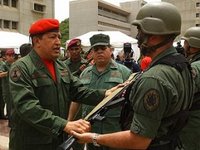 Russia and Venezuela, too, continue do business. In addition to Venezuela's purchace of 100,000 Russian-made AK-103 assault rifles, Comrade "Chavez also confirmed that an agreement had been reached for Venezuela to purchase 24 Russian Sukhoi-30 fighter jets.P and 24 Russian Sukhoi-30 fighter jets." To this, Christopher Toothaker of AP reports that, Comrade "Hugo Chavez's plans to build the first Kalashnikov factory in South America are stirring fears Venezuela could start arming his leftist allies in the hemisphere with Russian assault rifles."
Russia and Venezuela, too, continue do business. In addition to Venezuela's purchace of 100,000 Russian-made AK-103 assault rifles, Comrade "Chavez also confirmed that an agreement had been reached for Venezuela to purchase 24 Russian Sukhoi-30 fighter jets.P and 24 Russian Sukhoi-30 fighter jets." To this, Christopher Toothaker of AP reports that, Comrade "Hugo Chavez's plans to build the first Kalashnikov factory in South America are stirring fears Venezuela could start arming his leftist allies in the hemisphere with Russian assault rifles."
Comrade Chavez knows the stakes of this struggle and has made preparations for whatever eventuality Uncle Sam has planned in its crusade to preserve itself. Similarly China, Bolivia, Iran, and Russia now understand the total unity of strategy and purpose required to confront Uncle Sam's global empire.
Two recent polls - one commissioned by Pew Research Centre and the other by Harris - paint of picture of a world angry at Uncle Sam's behavior and untrusting of its ambitions. The Harris Poll confined itself to opinion about Uncle Sam in Europe, finding:
36 per cent of respondents identify the US as the greatest threat to global stability.The Pew poll is even more stark. It reported:
The poll, conducted in association with the FT, questioned a representative sample of 5,000 people in the UK, France, Germany, Italy, and Spain on a range of issues. Thirty per cent of respondents named Iran as the greatest threat to global stability, with 18 per cent selecting China.
The Washington-based Pew Research Centre, in a poll of 17,000 people in 15 countries between March and May, found more people concerned about the US presence in Iraq than about Iran's alleged nuclear weapons ambitions...
In Muslim countries with which the US has traditionally enjoyed a good relationship, such as Turkey - a member of Nato - and Indonesia, there have also been slumps. In Indonesia favourable ratings for the US have dropped from 75% to 30%, and in Turkey from 52% to 12%...
Favourable ratings of the US in India dropped over the year from 71% to 56%.
 This climate of distrust provided the backdrop for last week's Shanghai Cooperation Organisation negotiations in China, which brought together the leaders of 10 nations in and around central Asia. In the Guardian, Jonathan Watts highlights the myriad ways in which the meeting infringed on Uncle Sam's strategic interests:
This climate of distrust provided the backdrop for last week's Shanghai Cooperation Organisation negotiations in China, which brought together the leaders of 10 nations in and around central Asia. In the Guardian, Jonathan Watts highlights the myriad ways in which the meeting infringed on Uncle Sam's strategic interests:The group's potential role as a counterweight to the US was underlined by the presence of the Iranian president, Mahmoud Ahmadinejad, who received a warm welcome in Shanghai despite his country's standoff with international nuclear inspectors over Tehran's uranium enrichment program.While Uncle Sam's omnipresent threat against Iran no-doubt made its presence at the conference galling, the support Ahmadinejad received there for the positions he took no doubt left it apoplectic!
Mr Ahmadinejad said his country's participation could "turn the SCO into a strong, influential economic, political and trading institution at both regional and international levels and prevent the threats of domineering powers and their aggressive interference in global affairs".
The growing power of China has prompted a rethink in Washington, where rightwing analysts now speak of the SCO as an embryonic rival to Nato. Their fears have been strengthened in the past two years by the inclusion in the SCO of Iran, Pakistan, India, Mongolia and Afghanistan as either observer or guest nations.
 Such a developing alliance unified around resisting Uncle Sam's imperial grand strategy has many different components. Economically, China has begun to deepen its relationship with Iran while reaching out to African nations, including one of Uncle Sam's most obedient vassal states: Egypt. And, in a move that binds together Venezuela with Uncle Sam's chief nemesis in each hemisphere, Michael Fox reported in Venezuela Analysis that:
Such a developing alliance unified around resisting Uncle Sam's imperial grand strategy has many different components. Economically, China has begun to deepen its relationship with Iran while reaching out to African nations, including one of Uncle Sam's most obedient vassal states: Egypt. And, in a move that binds together Venezuela with Uncle Sam's chief nemesis in each hemisphere, Michael Fox reported in Venezuela Analysis that:The Iranian Vice-Minister of Light Industry, Faisal Megdad, announced this week that the Islamic Republic of Iran is planning to invest more than $9 billion in 125 development projects in Venezuela as part of bilateral cooperation agreements between the two countries.Fox went on to report that, "Megdad also proposed strengthening social and economic relations between Venezuela and Syria."
These moves - which aim to build a strong, unified, global economic foundation - represent an important element in the anti-imperialist struggle against Uncle Sam's oppressive neoliberal brand of economic suffocation. Moves away from the Greenback, which we've documented extensively here at Savage Justice help to build this foundation, too.
And while it is essential to create an economic infrastructre capable of operating outside Uncle Sam's hegemonic domination, it is naive to think of creating such an infrastructure without simultaneously making preparations to defend it - by force, if necessary.
To that end, the same countries resisting Uncle Sam's 'Debt Leverage Imperialism' economic model have, to Sam's chagrin, also begun to deepen their military ties. Registering its hostility to this development, the AP reported that Uncle Sam sanctioned four Chinese companies on fake pretexts, accusing it of helping Iran acquire weapons of mass destruction.
Syria and Iran just announced a series of new cooperation agreements "based on a strategic pact and unity against common threats," in which the two nations announced "a joint Supreme Defense Commission," according to AFP.
 Russia and Venezuela, too, continue do business. In addition to Venezuela's purchace of 100,000 Russian-made AK-103 assault rifles, Comrade "Chavez also confirmed that an agreement had been reached for Venezuela to purchase 24 Russian Sukhoi-30 fighter jets.P and 24 Russian Sukhoi-30 fighter jets." To this, Christopher Toothaker of AP reports that, Comrade "Hugo Chavez's plans to build the first Kalashnikov factory in South America are stirring fears Venezuela could start arming his leftist allies in the hemisphere with Russian assault rifles."
Russia and Venezuela, too, continue do business. In addition to Venezuela's purchace of 100,000 Russian-made AK-103 assault rifles, Comrade "Chavez also confirmed that an agreement had been reached for Venezuela to purchase 24 Russian Sukhoi-30 fighter jets.P and 24 Russian Sukhoi-30 fighter jets." To this, Christopher Toothaker of AP reports that, Comrade "Hugo Chavez's plans to build the first Kalashnikov factory in South America are stirring fears Venezuela could start arming his leftist allies in the hemisphere with Russian assault rifles."Comrade Chavez knows the stakes of this struggle and has made preparations for whatever eventuality Uncle Sam has planned in its crusade to preserve itself. Similarly China, Bolivia, Iran, and Russia now understand the total unity of strategy and purpose required to confront Uncle Sam's global empire.
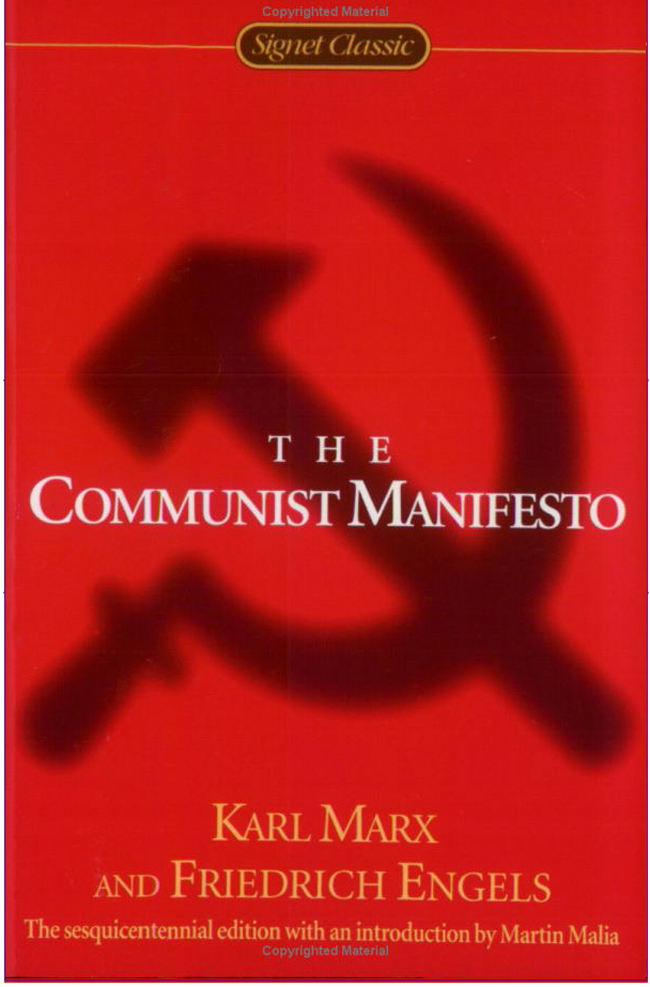


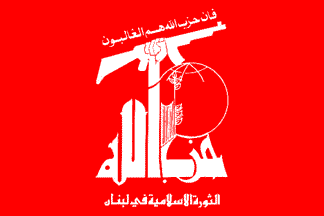



<< Home